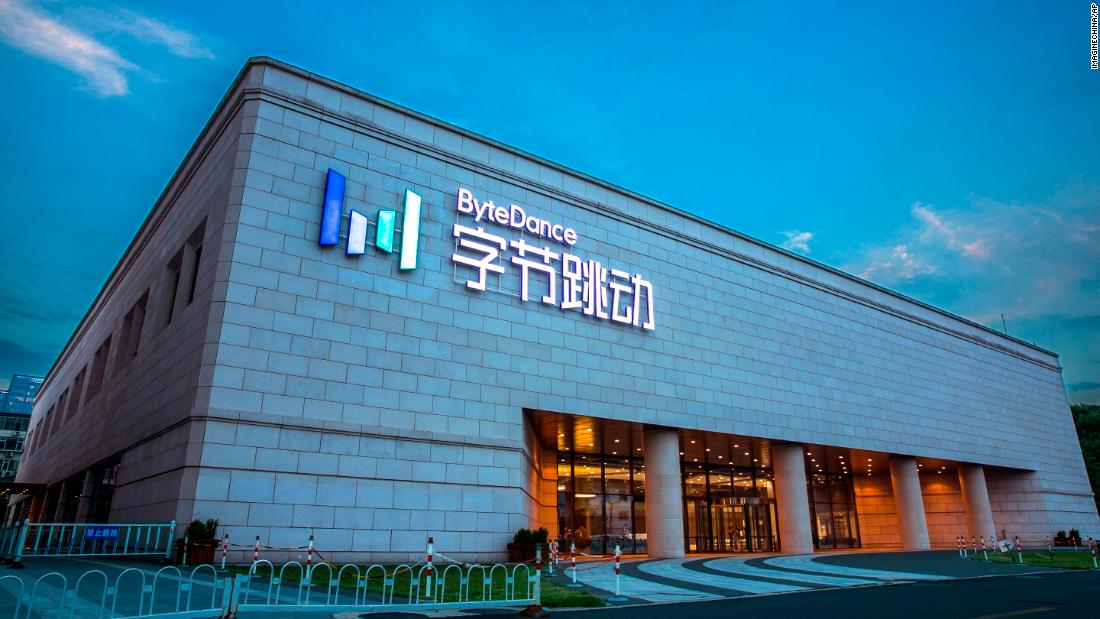
Hong Kong (CNN Business)Chinese social media apps have struggled to win over users beyond their home turf. TikTok is changing that.
Created by Beijing-based startup Bytedance, TikTok has gained an international edge over China’s established social media platforms, such as Tencent’s (TCEHY) WeChat, Sina Weibo (WB) and Alibaba’s (BABA) Youku.
“What sets ByteDance apart is its success in the social media category, which is dominated by Facebook, Twitter and Snap — all Western companies,” said Randy Nelson, head of mobile insights at analytics firm Sensor Tower.
Social video apps reached new levels of popularity this year. Three of them are in the top 10 most downloaded apps worldwide, according to Sensor Tower. ByteDance owns two of the three: TikTok and Vigo. The other is Instagram, which belongs to Facebook (FB).
ByteDance’s success is attracting big investors. It’s reportedly in talks with tech kingmaker SoftBank (SFTBY) about an investment that would value it around $75 billion, a huge jump from the $20 billion valuation it secured last year. That would make ByteDance one of the world’s most valuable startups alongside Uber.
ByteDance declined to comment on the reports. SoftBank didn’t respond to a request for comment.
Using AI to keep people hooked
ByteDance calls itself an artificial intelligence company. It uses machine learning and algorithms to figure out what people like and give them more of what they want to see.
The company is best known in China for the popular news app Jinri Toutiao, or “Today’s Headlines,” which it launched in 2012. People quickly got hooked on the app’s customized news feeds. Toutiao currently has more than 240 million monthly active users that spend on average 74 minutes per day on the platform.
ByteDance applied a similar formula to Douyin, a video app that launched in 2016.
It has Snapchat-like functions, where people can edit and add filters to 15-second videos before posting them online. The app has even spawned a phrase to describe people glued to their customized feeds: “shua Douyin” or “scrolling through Douyin.”
Going global
ByteDance had global ambitions early on. It launched its first international product in 2015, the English-language news app Top Buzz.
Last year, the company’s global expansion went into hyper drive. In just 10 months, it bought Los Angeles-based video startup Flipagram, released TikTok, the overseas version of Douyin, and paid $800 million for musical.ly, a lip syncing app popular in the United States and other Western countries.
Flipagram is now known as Vigo, and musical.ly users were moved onto TikTok earlier this year.
Those moves have given it a vast user base spread across Asia, Europe and North and South America.
ByteDance’s growing video empire has made it the world’s fifth biggest app maker, based on overall downloads, according to Sensor Tower. In the thirdquarter of 2018, downloads of TikTok were more than five times as high as in the same period a year earlier.
ByteDance says TikTok and Douyin together have more than 500 million monthly active users. That’s far more than Twitter (TWTR) and around half as many as Instagram, both of which are blocked in China.
The buzz around TikTok even caught the attention of Apple (AAPL) CEO Tim Cook. During a trip to Beijing last week, he visited ByteDance’s headquarters, meeting with people who work on TikTok and Douyin.
Money-making potential
Investors like ByteDance because its hundreds of millions of users attract a lot of advertising money.
ByteDance declined to disclose how much revenue its apps generate, but a source familiar with the company said Toutiao alone pulled in 20 billion yuan ($2.9 billion) in China last year.
The video apps are even more lucrative because they attract a lot of users in their teens and 20s. That’s what makes ByteDance such a threat to more established Chinese social media platforms, according to Xiaofeng Wang, an analyst with research firm Forrester.
“Consumers have limited time and attention. [Whoever] wins consumers especially younger generations will win advertising dollars,” she said.
ByteDance also makes money through revenue sharing deals. People on TikTok, for example, can buy digital coins to give to other people on the app — like throwing money in a performer’s tip jar. ByteDance takes a cut of those earnings.
Run-ins with the government
ByteDance’s founder and CEO is Zhang Yiming, a 35-year-old former Microsoft (MSFT) employee. People who have worked with Zhang describe him as someone who thinks deeply about technology and spends much of his free time writing code. The company’s name refers to 0s and 1s dancing together to form a byte, the binary code used by computers.
The startup’s meteoric rise has caught the Chinese government’s attention.
Like Facebook and Twitter, ByteDance is also battling fake news and inappropriate content.
Regulators shut down Toutiao for 24 hours late last year, alleging inappropriate content. In April, officials ordered that another ByteDance app, Neihan Duanzi, shut down permanently for publishing vulgar posts and displaying “improper public opinion.”
ByteDance reacted by issuing a public apology and promising to add thousands more employees to review content.
“Our product took the wrong path, and content appeared that was incommensurate with socialist core values,” Zhang said in a social media post at the time.
Read more: www.cnn.com









![[Video] How to get rid of bed bugs in Toronto](https://www.thehowtozone.com/wp-content/uploads/2019/10/maxresdefault-2-100x70.jpg)


